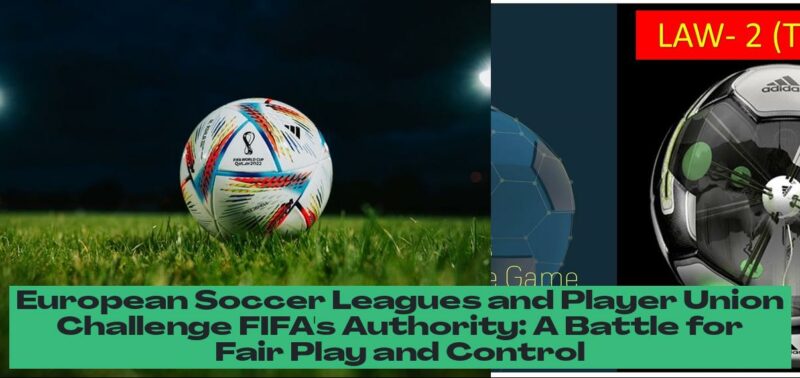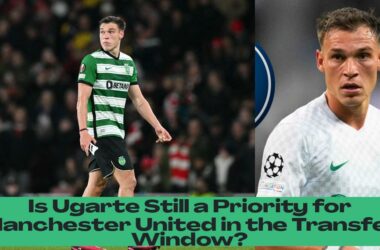European Soccer Leagues and Player Union Take on FIFA: A Fight for Fair Play and Control
The world of soccer is abuzz with a major legal battle brewing between the governing body of the sport, FIFA, and a collective of European soccer leagues and player unions. This clash, which has been brewing for some time, has finally reached its boiling point with a formal complaint filed with the European Commission. This complaint, filed on competition law grounds, marks a significant turning point in the power dynamics of the sport, raising crucial questions about FIFA’s control over the global game.
- European soccer leagues and player union have filed a formal complaint against FIFA with the European Commission on competition law grounds.
- The complaint challenges FIFA’s alleged abuse of dominance in the global soccer landscape, particularly regarding the addition of new competitions to an already congested calendar.
- The complaint accuses FIFA of unfairly leveraging its power to dictate terms that prioritize its interests over those of national leagues and players, creating an imbalance of power in the sport.
- FIFA’s lack of transparency and inclusivity in decision-making processes, as highlighted in the complaint, has contributed to tensions and feelings of being sidelined among leagues and players.
The Complaint: A Challenge to FIFA’s Dominance
At the heart of the issue lies FIFA’s alleged abuse of its dominant position in the global soccer landscape. The complaint, filed by the European Leagues and FIFPRO Europe, alleges that FIFA’s actions directly violate European Union competition law. Specifically, they point to FIFA’s decision to add new competitions to an already congested calendar, a move they see as detrimental to the health of the sport and a blatant disregard for the interests of leagues and players.
What makes this complaint particularly potent is the claim that FIFA’s actions constitute an “abuse of dominance.” The complaint argues that FIFA, by virtue of its unparalleled power and influence in the sport, has unfairly leveraged its position to dictate terms that favor its own interests over those of national leagues and the players themselves. This dominance, the complaint alleges, has created an imbalance of power, where FIFA exercises unchecked control over the sport’s calendar and, ultimately, the livelihoods of players and the success of leagues.
The complaint highlights FIFA’s refusal to engage in meaningful dialogue with national leagues and player unions. It argues that FIFA’s decision-making process has been shrouded in secrecy, with little consideration for the potential consequences on the wider soccer ecosystem. Instead of working collaboratively, FIFA has chosen to impose its will, leaving leagues and players feeling sidelined and unheard. This lack of transparency and inclusivity, the complaint emphasizes, is a major contributing factor to the current crisis in the sport.
The Stakes Are High: A Fight for the Future of Soccer
The implications of this legal battle are far-reaching for the future of soccer. A successful outcome for the European leagues and player unions could dramatically reshape the sport’s governance, potentially leading to a more equitable and transparent system. This shift could empower national leagues and players, allowing them to have a greater voice in shaping the future of the sport.
However, if FIFA prevails, the status quo could be maintained, leaving the organization with unfettered control over the global game. This scenario would likely lead to further frustration for leagues and players, who would continue to face the consequences of FIFA’s unilateral decision-making.
FIFA’s Response: A Defense of Its Authority
FIFA has yet to issue a formal response to the complaint, but its previous statements suggest a strong defense of its current role. FIFA has argued that its decisions are made in the best interests of the sport as a whole, emphasizing the importance of maintaining global unity and promoting the development of soccer around the world.
FIFA’s stance raises a key question: how can an organization that claims to represent the interests of the entire sport be so dismissive of the concerns of national leagues and player unions? This disconnect between FIFA’s self-proclaimed mission and its actual actions is at the heart of the current conflict.
The European Commission’s Role: A Crucial Mediator
The European Commission, the executive branch of the European Union, is now tasked with the challenging role of mediating this dispute. The Commission will need to carefully assess the merits of the complaint, scrutinizing FIFA’s actions to determine if they indeed constitute an abuse of its dominant position.
The Commission’s decision will have far-reaching consequences for FIFA, national leagues, and players alike. A ruling in favor of the European leagues and player unions would represent a significant blow to FIFA’s authority and could force the organization to rethink its approach to governance. However, if FIFA’s actions are deemed legitimate, the status quo could remain, potentially leading to further tension and conflict within the soccer world.
The Future of Soccer: A Time of Uncertainty
The current legal battle represents a pivotal moment in the history of soccer. The outcome of this conflict will have a profound impact on the sport’s future, shaping its governance, its calendar, and its relationship between players, leagues, and the governing body.
While the path forward remains uncertain, one thing is clear: this fight for control over the beautiful game will not be easily resolved. The European Commission’s decision will have a ripple effect throughout the global soccer landscape, potentially leading to a new era of cooperation or exacerbating the existing power struggles within the sport.
The next few months will be crucial as the European Commission investigates this complaint, ultimately determining FIFA’s fate and shaping the future of soccer for generations to come.









